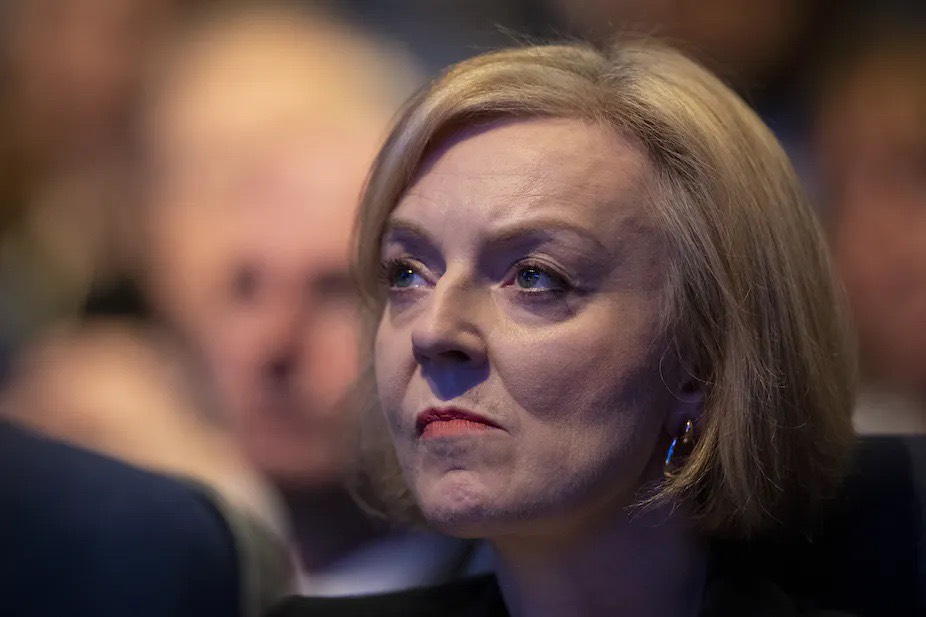Getting Britain Moving: Can Liz Truss Steer the hopes and glory of Britons?
There once was a time when the Sun never used to set in the British Empire, implying the immensity of the global
English hegemony. Today wrecked by an incomprehensibly high cost of living, energy crisis and rocked by series of
domestic violence, British public’s search to regain the sense of pride once so dear to them has turned seemingly
impossible. They now have a new leader with new promises but the question is can she deliver on them? Can she stand
for the greatness that the UK attaches itself too?

The UK stands at a critical juncture, the queen is gone, a new administration is in power and the country’s economic
and geopolitical standings are at stake. Amidst Russia’s unjustifiable war on Ukraine, tormenting economic hardships
and wobbly political developments, the country’s search for stability and solutions is more desperate than ever. Three
years into office, the Boris Johnson administration lost the confidence of the Tory MPs as Britain was grappled with a
high cost-of-living crisis. Boris’s ouster was a result of incidents that showcased the former Prime Minister’s lack of
character, be it the flaunting of Covid regulations or the Owen Paterson row. Nevertheless, his ouster was at a critical
geo-political moment for the UK. Following Boris’s resignation, the race to replace him commenced with Rishi Sunak
as the front-runner in the initial rounds. Also in the race were Boris’s former Foreign Secretary – Liz Truss, Leader of
the House of Commons – Penny Mordaunt, Minister of State for Local Government – Kemi Badenoch and Minister of
State for Security – Tom Tugendhat. While Rishi was the favourite to succeed Johnson, his high-handed temperament
and privileged status imperilled his chances. Liz Truss overtook Sunak and inflicted on him a defeat with a margin of
21,000 votes. Truss had gained momentum following her promises to ease the cost-of-living crisis, bring down energy
prices and change the tax regime. She also inherits from her successor the pivotal role Britain is playing to aid Ukraine
in its war efforts against Russia. Tall promises got Truss in-office of the Prime Minister, but, can she stand tall enough to
deliver on them?
A Bleeding Britain:
The UK has been in an economic slowdown for over a decade now. It has fallen behind major rich countries, with
stagnant wage growth and in-work poverty at a historic high. Taking into account the living costs, today’s average pay is
no higher than that of 2007. Successive administrations have made attempts to provide the economy with the
necessary impetus but not to much success. Britain continues to be deeply affected by the economical ramifications of
Brexit and a strong sense of enhanced economical links with the EU, continues to be ignored in corridors of power.
For Truss, the challenge on the economic front was much harder with the war in Ukraine, soaring inflation (40-year
high) and the global economic slowdown. To top it off is the critical cost-of-living crisis – the primary issue for the
ordinary citizens and promising to mitigate which Truss secured the votes of Tory members. In her election campaigns,
Truss highlighted her preparedness and willingness to take “bold decisions”, the major component of which was the
“bold tax cuts” as a measure to reinforce investment in the economy, something that did not go down well with
mainstream economists. Post her election to the office of Prime Minister, there remains to be high suspicion around
the direction in which ‘Trussonomics’ would lead Britain’s economy into. Economists have discredited Truss’s intentions
of revamping the economy through deregulation and tax relief. While the current economic circumstances make it
necessary for the government to take galvanising steps, it was important for these steps to be introduced responsibly.
In contrast, Truss’s plans sent the global markets into a tailspin, pushing up mortgages to record-high levels. Given the
declivity that global markets faced, just, by the expression of her intentions, the Prime Minister-elect needed to take
everyone into confidence, including BoE officials, economists, policy-makers and the British citizens, before going
through with her plans – something she failed in.
Reflection of the first 40 days in-office
The first 40 days of the new administration have exposed the government’s fuzziness on its vision to tackle the
constantly exacerbating economic situation. The suspicion around Truss’s abilities to deliver in times of challenge has
only grown and so has the public despair. Beyond question, the pressure on the new Prime Minister was of immense
scale as she took office, pushing her to take immediate hap-hazarded actions that have only landed her in more
trouble. The ambiguity within the government and the bureaucracy on its plan of action has subjected the Truss
administration to intense criticism and with passing time its severity only seems to increase. ‘Tax Cuts’ were at the
centre of Truss’s political campaign and were the first on her list to initiate, however a lack of coordination and
consultation with economists and other government officials paved way for a crisis instead of relief.
Truss’s choice for the Chancellor of Exchequer at the most critical juncture of the British economy was her trusted
lieutenant – Kwasi Kwarteng. Economists have been critical of Mr Kwarteng’s appointment, drawing on the op-eds
written by him. Nevertheless, Mr Kwarteng did not disappoint his critics as his ‘mini-budget’ introduction in the
Parliament sent global financial markets into a tailspin. The ‘mini-budget’ consisted of tax cuts worth 45 billion pounds
over five years, making it Britain’s biggest such package since 1970. These tax cuts brought down the basic rate of
income tax, applied to high incomes, from 45% to 40%. There were also cuts in basic rates of income tax from 25% to
19%. The cuts were introduced alongside a massive increase in public spending & energy subsidies. Together, these
mammoth changes were to account for a 5% increase in public borrowing of the GDP. The government intended to
incentivise investments through tax cuts and ease the cost-of-living crisis through subsidies, this was done without
trimming public spending. While, Mr Kwarteng optimistically announced the target level of growth to be 2.5%
(something not seen since the 2008 finical crisis in the UK) could not have anticipated his budget to have the absolute
opposite impact, leading to soaring interest rates and a historic crash of the pound – below $1.11, lowest since 1985.
Given the catastrophic impact of the mini-budget on the global financial markets. A hulking pressure was on the Prime
Minister to reverse her tax cuts and take accountability for the ravaging instability in the global financial markets. The
Prime Minister reacted by firing her Chancellor of Exchequer, even before the latter’s plane had kissed British soil,
arriving from the US. The dismissal of Mr Kwarteng invigorated the calls for the resignation of the Prime Minister, and
some Tory MPs too did not shy away from showcasing their dissent towards the government’s ill-conceived economic
handlings. Facing severe political headwinds, the Prime Minister appointed Jeremy Hunt as the new chancellor of the
Exchequer, whose first action after assuming office was to recognise the government’s mini-budget fiasco. Finally, late
on Monday, the Prime Minister addressed a press conference apologising for the government’s fumble on the economic
front by saying – “I do want to accept responsibility and say sorry for the mistakes that have been made”. She even
displayed her confidence to lead the Conservative party into the next general elections.
The most humiliating blow to Truss was delivered by Jeremy Hunt’s announcement of reversing all the tax cuts introduced by the
government mere weeks ago. While the market’s welcomed Hunt’s decisions, Truss was now left mortified as her ‘centrepiece’ had
to be ripped off for her government to survive. She sat blandly in the Parliament, as Mr Hunt announced the reversals and
appeared to be relegated within her government. Hunt further declared that the government will have to take “eyewatering
difficult decisions” to revamp the economy. The chancellor also said the government would end its costly state intervention to
cap energy prices next April. It will be replaced by a more targeted, though still undefined, program that could increase
uncertainty for households facing soaring gas and electricity bills.
To put it in a nutshell Prime Minister Liz Truss has merely survived by reversing her witless decisions, in the six weeks as
Prime Minister she has only been able to successfully increase her difficulties. With suspicion around her leadership at its zenith,
the government is now in desperate need of a breakthrough accomplishment to stabilise the political turmoil, let alone the
economic one.
How can Truss make through?
For Prime Minister Truss and her government, the only thing lying ahead are challenges, tons of them, and her survival
hangs on her ability to be judicious and decisive. Truss rushed in too quickly into a very delicate situation and smashed
the fragile British economy a bit too hard, sending the global markets in a tailspin, facing headwinds on multiple fronts
now – the situation seems beyond repair. Many are asking if the Prime Minister would last till Christmas and that is a
very genuine question, not only for Truss but the whole of Britain. However, in the Prime Minister’s own words in
Parliament “I am a fighter and not a quitter” she is confident to lead the Tories into the next general election.
Unfortunately for her, the question is about whether the Tory MPs are now confident in her leadership. Truss has taken
the first, though bleak, step towards survival – reversal on tax cuts. She now has to focus on gaining momentum to the
economy and the confidence of the British people and the Tory Party. The cost-of-living crisis in the UK is inflicting
tremendous pain on the commoners with the impact of Brexit already hurting the economy. Truss will have to deliver
by reducing the cost-of-living crisis and bolstering domestic consumption for the economy to revamp. She will have to
meticulously find the balance between compromising on climate action and easing the soaring energy bills. Truss will
have to forecast a trajectory of the British economy, based on her efforts, to allure investments. She will have to
negotiate from a position of weakness on issues such as the Scotland Referendum and decisively act with the First
ministers of both Scotland and Wales, who are leaving no stone unturned to get on Truss.
Prime Minister Truss’s fate is hanging in an adverse balance. Long-standing issues plus the ones created through her
impromptu mini-budget have put the government’s credibility in question. Labour MPs already had termed Truss as an
‘appointed’ Prime Minister and had called for early general elections, stating that the Tory government had no ethical
stand to be in power. The mini-budget fiasco has re-invigorated their calls for early general elections, which if called will
likely wipe clean the Conservative party in the Parliament.
Overall, Britain’s political instability has caused utter humiliation for the country all over the globe. Russia’s unjustifiable
war in Ukraine and the turmoil in Europe are crucial concerns for the UK and the whole continent. The situation will
only exacerbate if a major European power such as the UK is unable to cope with challenges at home, let alone stand
for democracy and human rights abroad. Chances of Truss’s survival are thin but maybe it is spinning the wheel until a
leadership arises to provide the UK with steadfast economic growth and give Britons some breathing space if not the ancient British glory.

